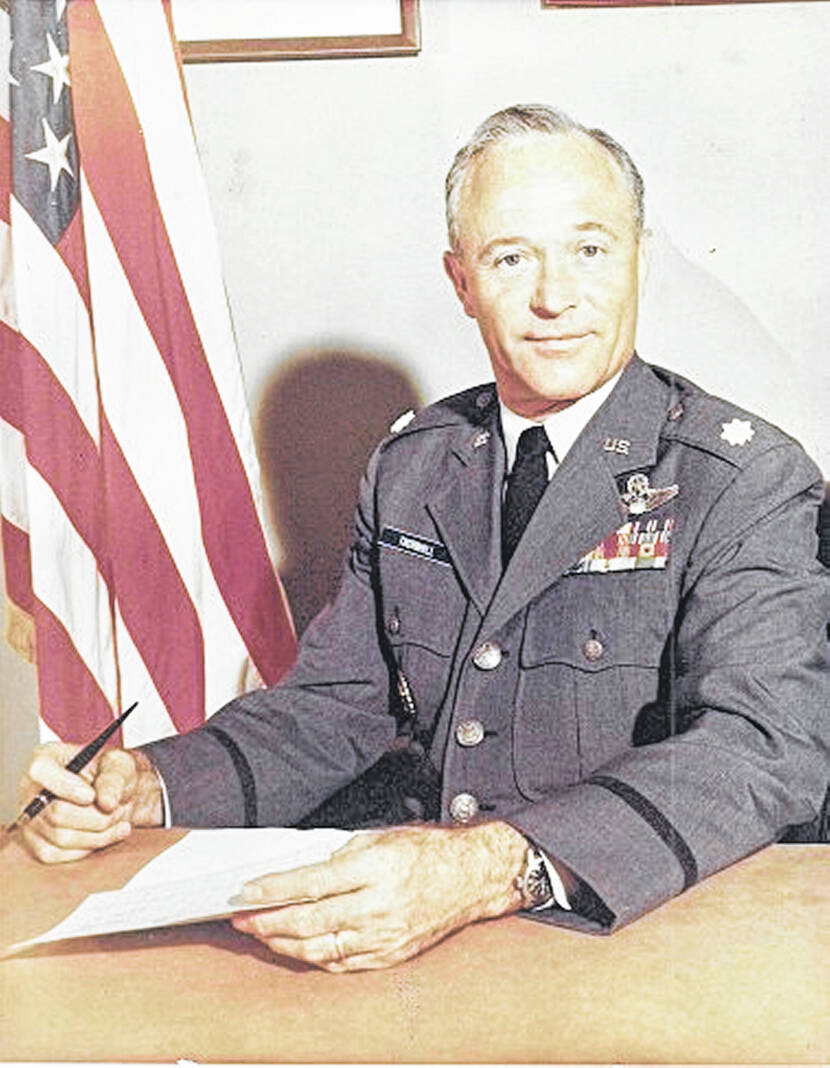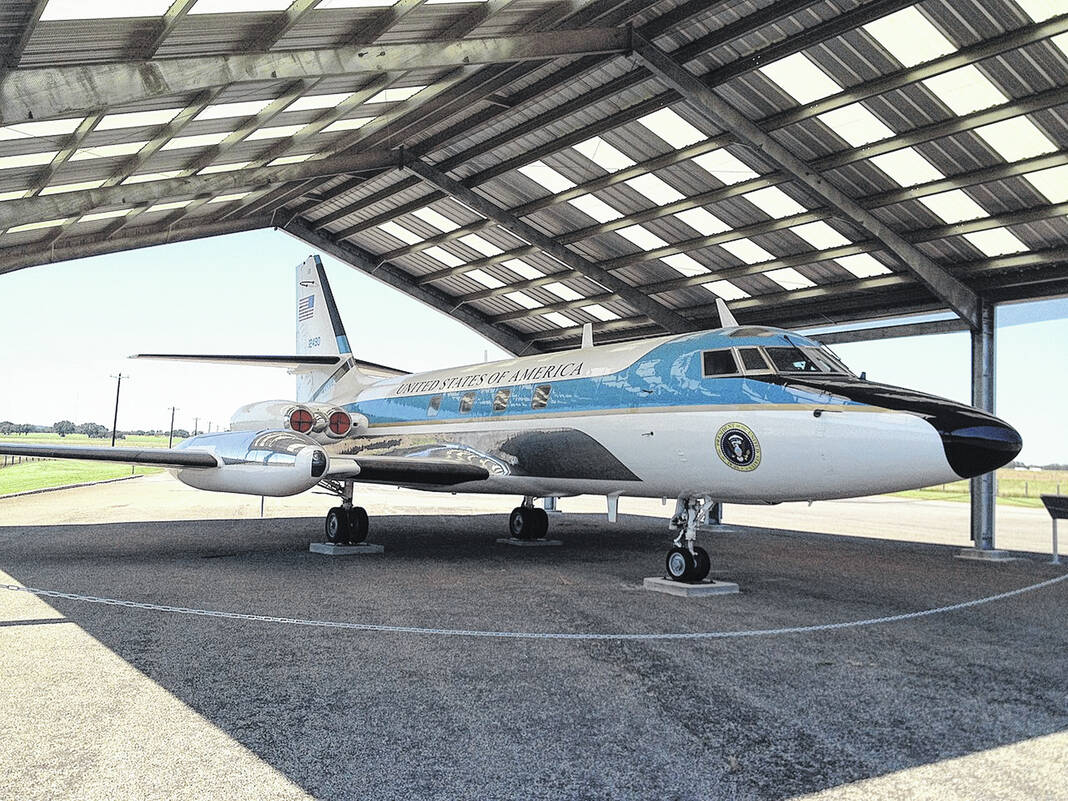
This picture of Lt. Col. Paul Thornhill as well as several other items can be seen in the Keepers of Freedom exhibit at Garst Museum

LB’s Jet Star aircraft is on display at the Lyndon B. Johnson National Historical Park. It could have been one or similar to one Lt. Col. Thornhill would have flown.
https://en.wikipedia.org/wiki/Air_Force_One
By Ryan Berry
DailyAdvocate.com
AUSTIN, TEXAS — There have been relatively few people that have ever flown a president. Afterall, presidents have only been relying on their personal pilots since Franklin Roosevelt in the mid-1940s. However, Darke County can be proud of one of its own who rose through the ranks and continued his education time and time again in order to prove he could fly a variety of planes and eventually become an Air Force One pilot.
Lt. Col. Paul Thornhill, a Rossburg native, was born in 1920 and went on to have a stellar career in the United States Air Force. He retired after 28 years of service and spent his final days in Oak Hill, Texas, near Austin. Part of his career included flying Lyndon B. Johnson when he was a vice-president and then, after the assassination of John F. Kennedy, as president. He even flew the former president after he left office.
In 1987, Lt. Col. Thornhill did an oral interview with Ted Gittinger for the LBJ Library Oral Histories. While remarking on the pictures Johnson presented to him and his family, Thornhill said, “Yes. He gave my daughter one, a picture of Lynn for a wedding gift and we’ve got one there of the pope that he signed, he sent, gave me, he and the pope. It was good duty. I sure enjoyed it for—I was born in a small town back in Ohio and a couple of hundred people so I feel kind of proud that I was associated with the president that way.”
He began flying Johnson in October 1962. Thornhill said he was approached by Captain Jim Cross. Cross had previously flown the vice president several times on the Jet Star. “Jet Star, you know, was [a] fairly new aircraft in our wing there at SAM [Special Air Mission]. They came out in 1961, late 1960 and 1961. And Cross had flown Johnson several times and Cross married a local Austin girl,” he said. “In conversations, the vice president at that time learned these things about Jim and he liked Jim so he went to the secretary of defense and asked if he could have a Jet Star. Of course, it had to be approved by President Kennedy and they finally agreed that yes, he could have a Jet Star. So, he picked Cross to be his pilot [and] Cross picked me to be his co-pilot.
Reading through the transcript of the interview, it is easy to tell that Thornhill loved being a pilot. Although not all of it was as glamorous as it may seem.
Prior to serving the vice president/president, Thornhill had a scary moment. While flying a B-24 he had issues on the takeoff, “We had five different bases that we flew into in China and on one trip we didn’t complete our mission,” he said. “We crashed one right there on the home base. We flew through trees, we hit trees on take-off and it was late at night and did quite a bit of damage to the hydraulic system and we came back, we went out over and dropped our four bomb bay tanks. We had four 500-gallon tanks in the bomb bays, and we dropped those and burned off some of the wing fuel, dropped the toe heel tanks and we came back in and landed. It ran off and over there they have these irrigation ditches paralleling the runways and then at the end they have these large drainage ditches, and we came in and landed and applied the brakes and of course the aircraft veered off the runway and the right main gear jumped the little ditch. But the nose gear went into the ditch and paralleled it, and we went down to the end and hit down at the end and thank God it didn’t burn. They had to cut me out with hacksaw blades and carted me off to the little town of Dacca, to the hospital and then transferred me later on to General Hospital in Calcutta and this happened on December 6, 1944. I came home in 1945. So, it just tied up about a year, all total, before I got back on active duty and then I elected to separate and now serve as a state reserve.”
Five years later, 1951, Thornhill was recalled.
Thornhill spoke highly of President Johnson and appreciated what he offered. He laughed as he recalled one encounter when the Air Force One crew learned they needed to be closer to the president. “Well, we came out there [LBJ’s ranch], took him out there that night or that morning and he said, came up there and stopped, and he said, ‘Well now what are you going to do?’ So, Cross looked at me, blank, and I looked at him and Cross said, ‘Well, Mr. President, I guess we’ll go back to Bergstrom like we always do,’ and he said, ‘Well how am I going to get out of here if they drop the bomb?’ Our mouths just dropped open, you know. So Cross finally got his wits about him, he said, ‘Well, how about we just go down there and stay in the guest house?’ Fine. So, we stayed in the guest house. We stayed there about two weeks and we got kicked out of there. That was long enough. Using Mrs. Johnson’s towels and sheets and of course eating in there in the guest house, but we had to sign [a] roster, you know, we had to pay for our meals, and we paid him so much a night for staying in the guest house.”
Thornhill did fly Johnson home after he relinquished his presidency. “I remember that it was fairly late at night as I recall, and I don’t recall who was with me on the crew. I know Short had the little airplane down here and we took him out to the ranch, then, in the little airplane. There were gobs of people on board both airplanes and when we did land out at the ranch then all of Johnson City was out there and he had a big thing going out there. A lot of people from Fredericksburg and towns all around came out there. I never saw so many people in all of my life, but he didn’t come up and say anything to either one of us. We didn’t get to see him after that to say goodbye or anything and we hung around out there for a little while and finally got clearance from—Haywood Smith was the military aid at that time. Marine Lieutenant Colonel and he finally told us go ahead and take the airplane back and we went back to Bergstrom and I flew the big airplane back to Andrews and Short flew the little one back to Andrews. But they had a hangar full of people out there. They had some speeches going on.” He admitted the final flight was anticlimactic for him.
For a short time after Johnson’s presidency, Thornhill was his personal pilot. After learning it would be another year or more before he could earn his full-bird status as a colonel, Thornhill retired.
Thornhill passed away on Dec. 26, 1995 in Austin, Texas. He was 75.
To read the entire transcript from the LBJ Library Oral History, visit 27500879-oh-thornhillp-19871204-1-05-19.pdf
To contact Daily Advocate Editor Ryan Berry, email [email protected].




